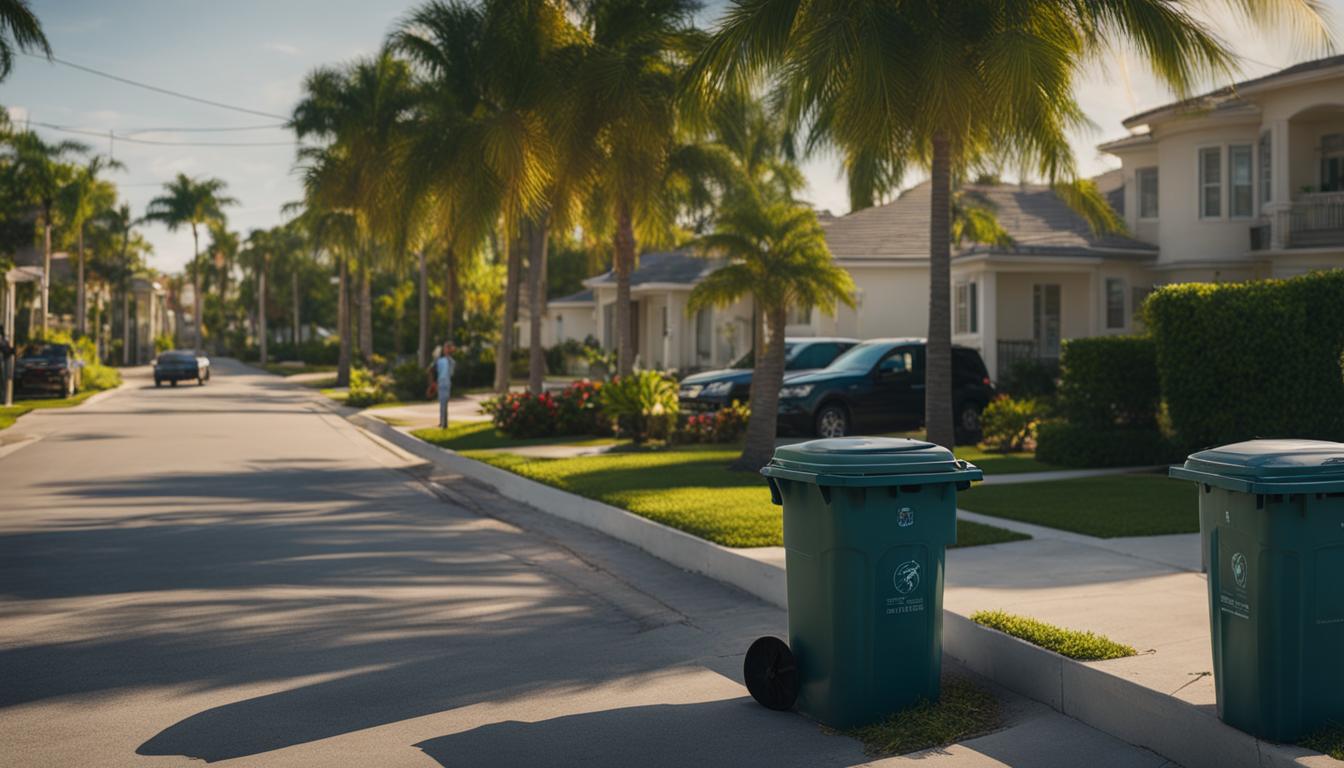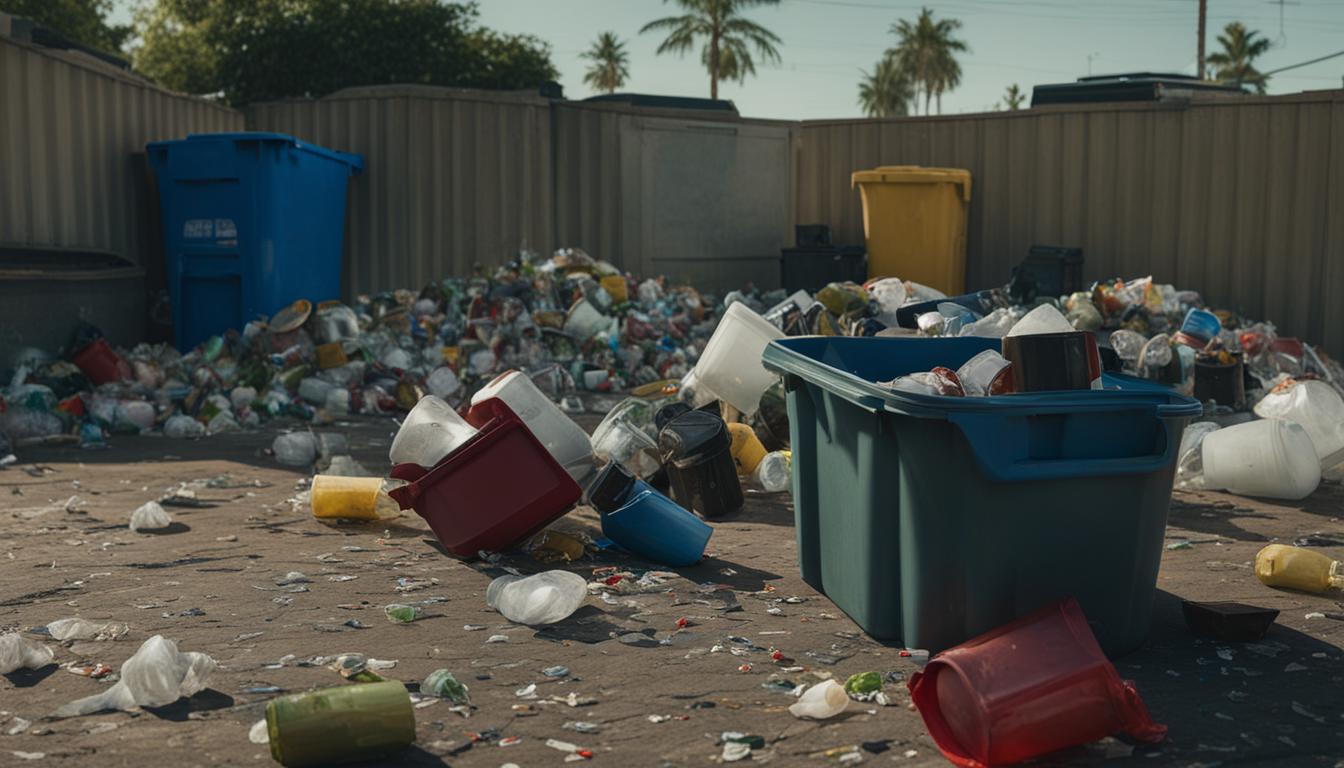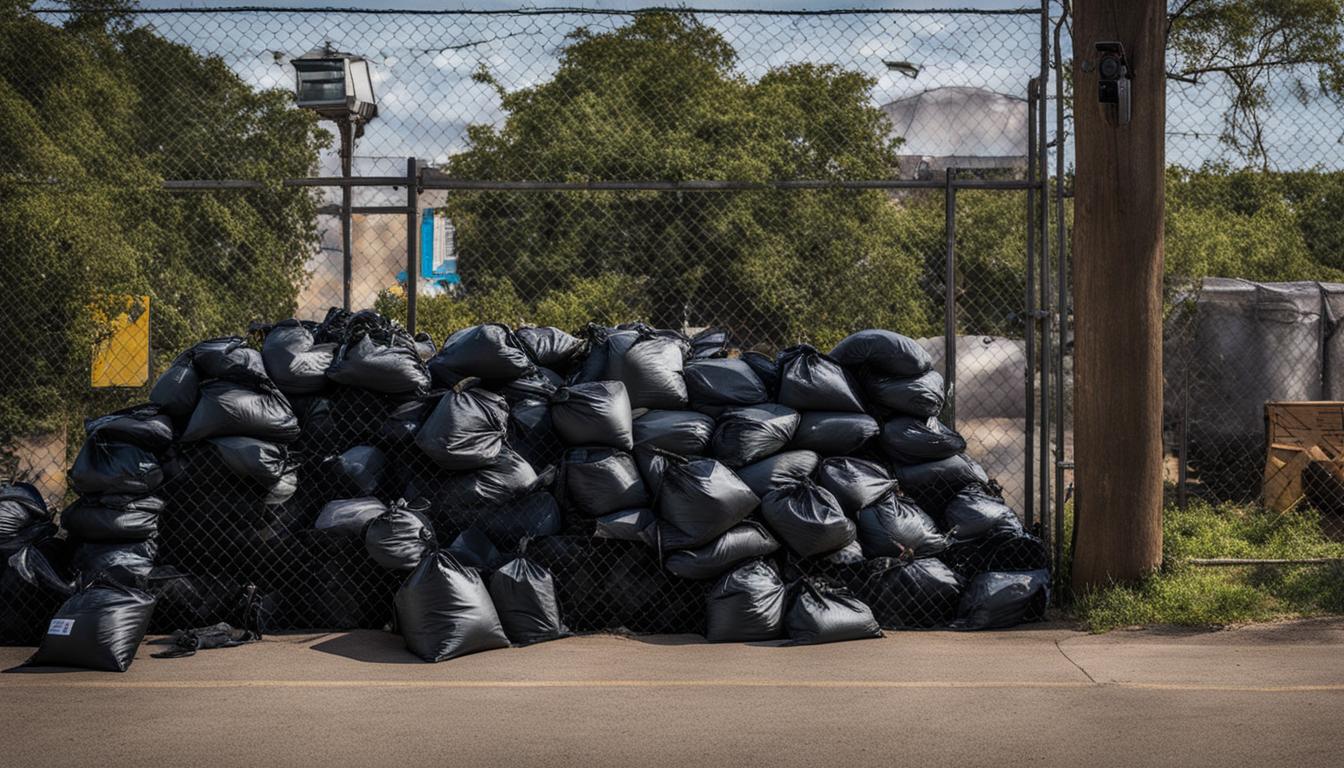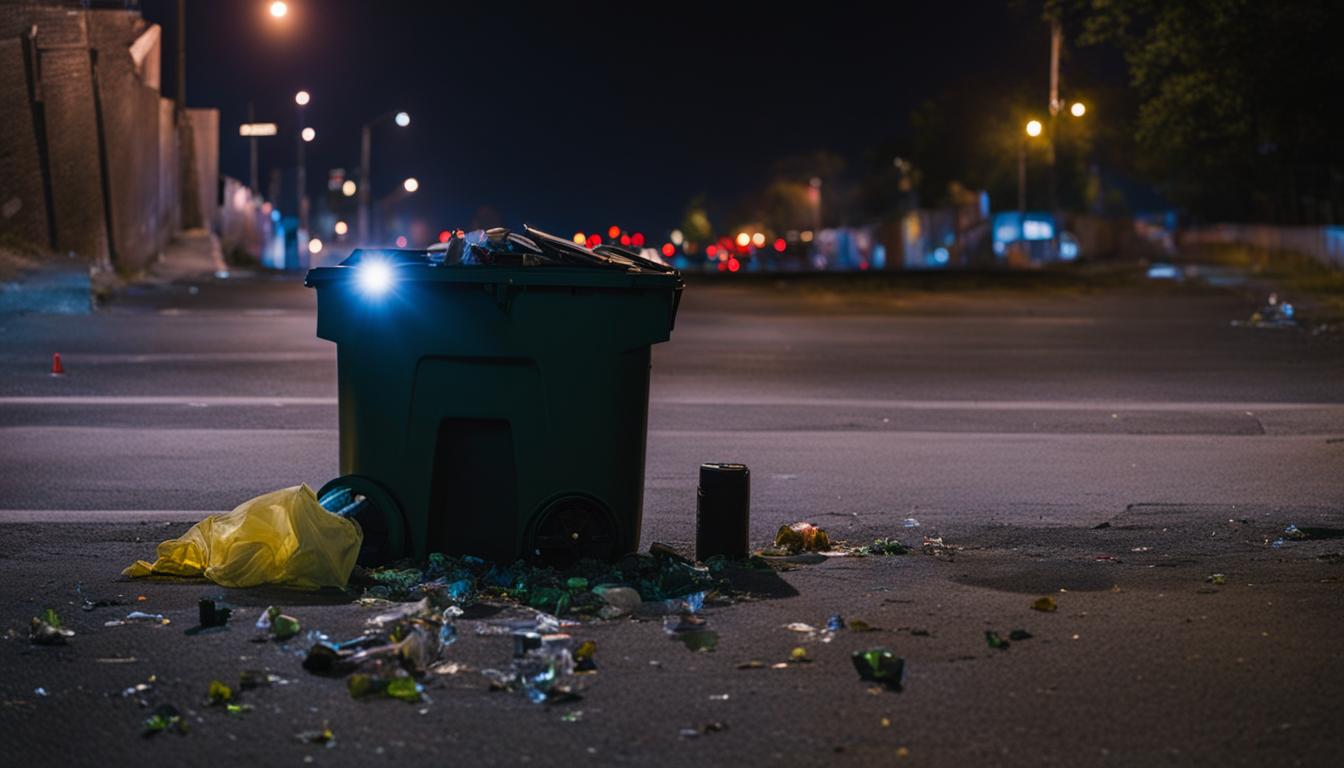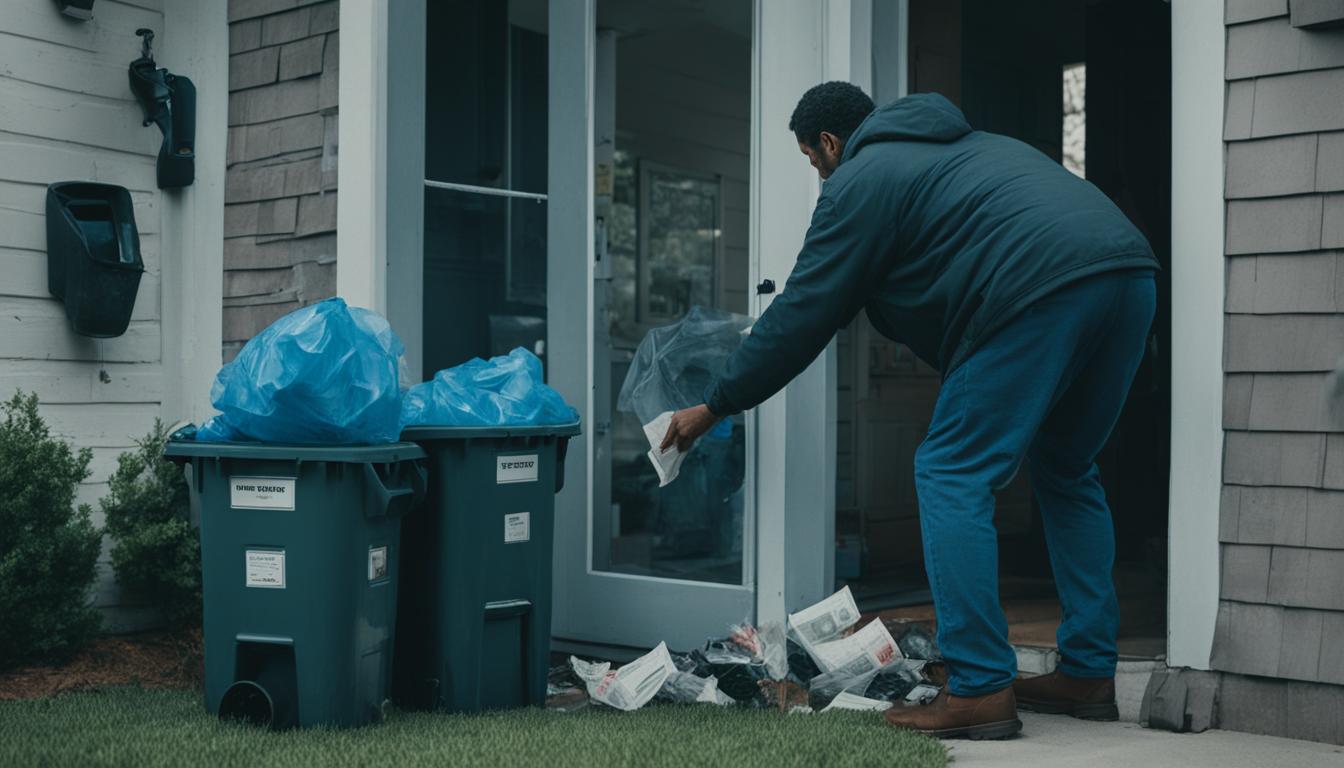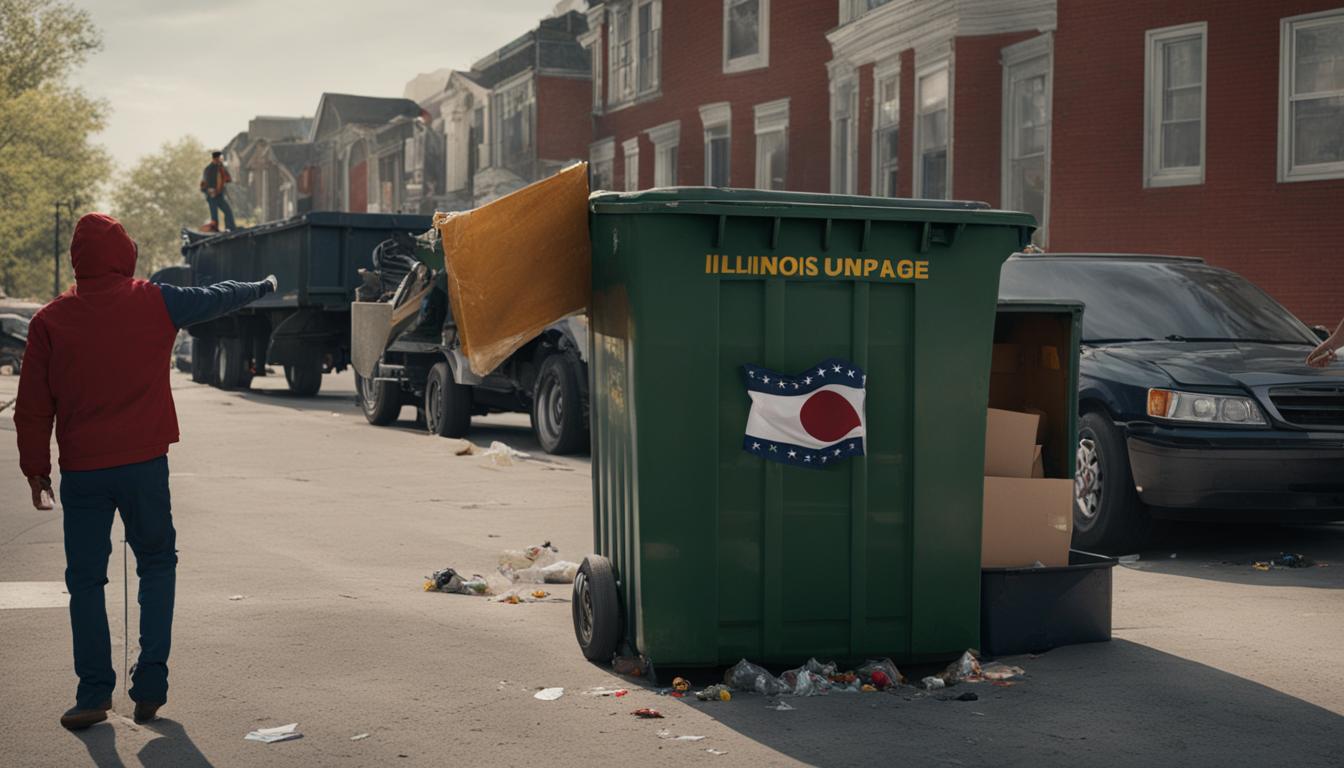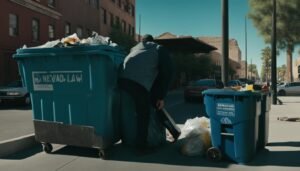Disclosure: This Post Contains Affiliate Links; We earn a commission on purchases.
When it comes to trash privacy laws in Florida, many people wonder if it is illegal for someone to go through their trash. The answer may surprise you. While there are certain regulations surrounding garbage invasion of privacy and dumpster diving, in Florida, it is generally not illegal for someone to go through your trash.
According to a U.S. Supreme Court decision in 1988, garbage left in the “outside curtilage” of a home or property is considered public domain. This means that once you place your trash on the curb for pick-up, it is no longer private property and can be accessed by others without legal consequences.
Key Takeaways:
- Dumpster diving and trash picking is not illegal in Florida.
- Garbage left on the curb for pick-up is considered public domain.
- The City of Jacksonville does not have a specific law against trash picking.
- Florida State Statute allows for a warning or arrest in cases of abandoned trash or trespassing.
- Dumping trash on the street or private property is illegal under the Florida Litter Law.
What Can Your Trash Reveal About You?
Your trash holds more than just discarded items – it can potentially expose a wealth of personal and private information. From everyday items like discarded mail and credit card statements to utility bills and receipts, your trash can reveal sensitive details such as your social security number, bank account information, and even your shopping habits. It’s crucial to understand that the contents of your trash can be a treasure trove of valuable data for individuals with malicious intent.
“Trash has long been a source of valuable information for various purposes, be it law enforcement investigations or civil court cases.” – Jessica Anderson, Private Investigator
The consequences of someone gaining access to your personal information from your trash can be significant. Law enforcement agencies, for example, have the legal right to search through trash without a warrant to find evidence related to criminal activities. Private investigators can also utilize trash as evidence in civil cases. Moreover, those who engage in dumpster diving specifically for personal data can use the information obtained for various nefarious purposes.
Additionally, it’s important to bear in mind that trash left on the curb is easily accessible to potential threats such as thieves and stalkers. These individuals can easily sift through your trash to gather information about your routines, habits, and potentially even your financial situation. This makes it imperative to be cautious and aware of the sensitive nature of the information we discard.
Considering the potential risks associated with the exposure of personal information through trash, it’s essential to take appropriate measures in safeguarding your privacy.
The Legality of Dumpster Diving
Dumpster diving is a practice that involves searching through trash or waste with the hope of finding discarded items of value. While dumpster diving is often seen as an unconventional way to acquire goods, it is essential to consider the legal implications before engaging in this activity.
In general, dumpster diving is considered legal when conducted in public areas where garbage is left for collection. Once trash is placed in a public area, such as on the curb, it is considered public domain. Accordingly, individuals are permitted to search through and collect items from publicly accessible garbage bins.
However, it is important to note that the legality of dumpster diving can vary depending on the location and circumstances. Dumpster diving on private property or in enclosed areas, such as behind fences or gates, may be considered trespassing and could potentially be illegal. Respect for private property rights is crucial, and individuals should be mindful of any signs indicating that an area is off-limits.
It is also important to be aware of any specific dumpster diving laws or regulations that may exist in your area. Some cities or states may have local ordinances that prohibit or regulate dumpster diving to varying extents. Therefore, it is advisable to familiarize yourself with the relevant laws and regulations in your jurisdiction to ensure compliance.
Engaging in dumpster diving responsibly and legally is not only crucial for avoiding legal repercussions but also for promoting ethical behavior. It is essential to respect the privacy and property rights of others while engaging in this activity.
Quick Facts:
- Dumpster diving is generally legal in public areas where garbage is left for collection.
- Searching through dumpsters on private property or in enclosed areas may be considered trespassing.
- Be aware of any local ordinances or regulations that may prohibit or regulate dumpster diving in your area.
- Respecting private property rights and looking for signs indicating off-limits areas is essential.
Understanding the legality of dumpster diving and adhering to the relevant laws and regulations ensures a responsible and respectful approach to this activity.
Reasons People Engage in Dumpster Diving
People engage in dumpster diving for various reasons. Some do it to make extra money by finding valuable items that can be sold. Others do it to find food in good condition that has been discarded by stores or restaurants. Electronic waste, clothing, metal, wood, and empty cans/bottles are other items that people may search for through dumpster diving.
Motives for Dumpster Diving
Dumpster diving can be a lucrative activity for those looking to make some extra money. Many items that are discarded can still hold value and be resold. Some of the common motives for dumpster diving include:
- Finding valuable items to sell
- Obtaining free food
- Collecting electronic waste for recycling
- Discovering discarded clothing and accessories
- Collecting recyclables for redemption
Dumpster diving provides an opportunity to uncover hidden treasures that others may have overlooked. Whether it’s finding a valuable antique or a perfectly good piece of furniture, the possibilities are endless.
Examples of Valuable Dumpster Finds
| Item | Estimated Value |
|---|---|
| Antique furniture | $500+ |
| Electronics (working condition) | $100+ |
| Designer clothing | $50+ |
| Jewelry | $50+ |
| Unused gift cards | $25+ |
As shown in the table above, dumpster diving can yield significant financial returns when valuable items are found. It’s important to note that these values are estimates and can vary based on condition and market demand.
In addition to making money, dumpster diving can also help reduce waste and promote environmental sustainability by salvaging usable items and recycling materials.
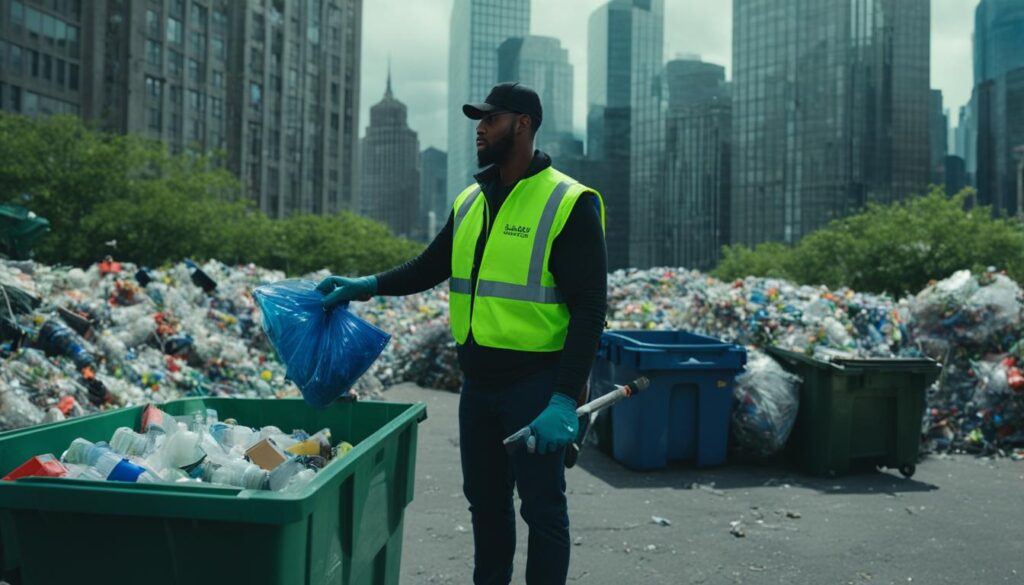
Trash Privacy and the Fourth Amendment
When it comes to your garbage, you may be surprised to learn that it is considered personal property, and you have a reasonable expectation of privacy in what you throw away. The Fourth Amendment of the United States Constitution protects against unreasonable search and seizure, which means that the police generally cannot search through your trash without probable cause or a search warrant.
However, there are some exceptions to this rule. When trash is left in a public area, such as on the curb for pickup, the expectation of privacy is diminished. In these cases, police can search through your trash without a warrant. But what happens when it’s unclear who placed the trash on the curb? Disputes may arise regarding the legality of the search.
It’s important to note that even though law enforcement can legally search through your trash in certain circumstances, they cannot use evidence found in your trash to obtain a search warrant for your home or property. The evidence must be obtained through independent means in order for it to be admissible in court.
Trash Privacy and the Fourth Amendment: Key Points
- Garbage is considered personal property, and individuals have a reasonable expectation of privacy in their trash.
- The Fourth Amendment protects against unreasonable search and seizure.
- Police generally cannot search through your trash without probable cause or a search warrant.
- When trash is left in a public area, such as on the curb for pickup, the expectation of privacy is diminished.
- Disputes may arise if it’s unclear who placed the trash on the curb.
While the Fourth Amendment protects your trash as personal property, it’s essential to be mindful of what you discard. Items that contain sensitive personal information should be properly disposed of to minimize the risk of identity theft or privacy breaches.
Protecting Yourself Against Dumpster Diving Crimes
When it comes to preventing dumpster diving crimes, taking necessary precautions is essential. By following these simple steps, you can safeguard your personal information and minimize the risk of becoming a target.
Shred Your Confidential Documents
One effective way to protect your personal information is to shred any confidential documents before discarding them. This includes bank statements, credit card bills, medical records, and any other documents that contain sensitive data. Shredding these documents ensures that your personal information remains confidential and prevents dumpster divers from obtaining valuable information.
Be Mindful of Your Trash Placement
To further safeguard your personal information, avoid placing your trash out earlier than necessary. By putting your bins out right before collection, you limit the time that potential dumpster divers have to access your discarded items. Additionally, retrieve your bins as soon as possible after they have been emptied to minimize the chances of anyone going through your trash.
Report Suspicious Behavior
If you notice any suspicious behavior in your neighborhood, it is crucial to report it to the authorities. This includes individuals loitering around dumpsters, attempting to access private property, or displaying unusual interest in trash cans. By reporting suspicious behavior, you can help prevent potential crimes and protect your community from dumpster diving incidents.
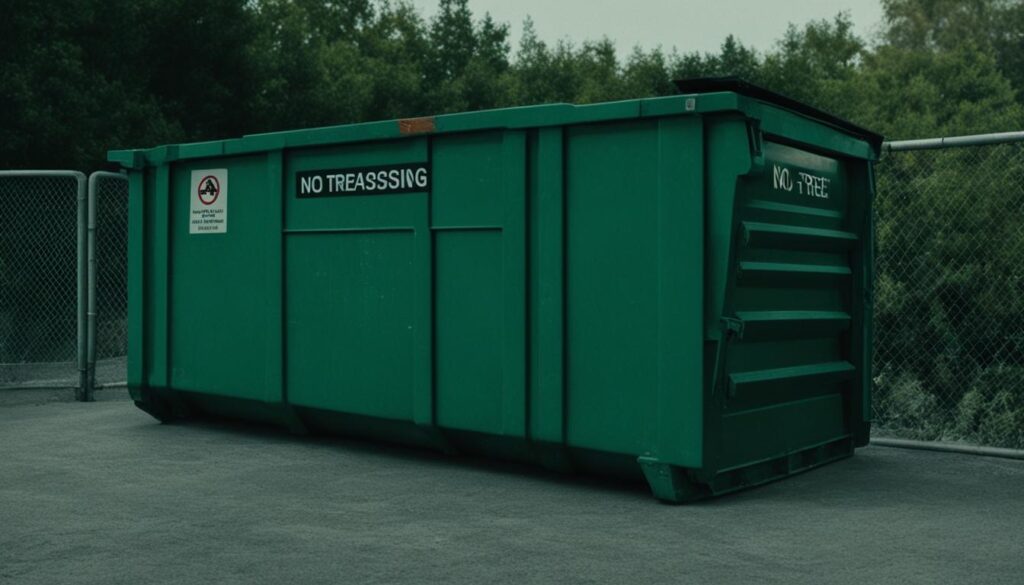
Protecting yourself against dumpster diving crimes is a proactive step in preserving your privacy and preventing the misuse of your personal information. By shredding confidential documents, being mindful of your trash placement, and reporting suspicious behavior, you can minimize the risk of falling victim to dumpster diving-related crimes.
Conclusion
In conclusion, dumpster diving is generally legal in Florida as long as it is done in public areas where the garbage is left for collection. The U.S. Supreme Court decision in California vs Greenwood established that garbage left in the “outside curtilage” of a home or property is considered public domain. However, it is important to respect private property and be aware of any local ordinances that may prohibit trash picking.
Protecting your personal information is crucial in preventing dumpster diving-related crimes. Take steps to safeguard your sensitive data by shredding confidential documents before discarding them. Additionally, be vigilant about reporting any suspicious behavior in your neighborhood, which can help law enforcement prevent potential crimes.
Remember, while your trash may seem like waste, it can contain valuable information that should be protected. By understanding the legality of dumpster diving, respecting privacy rights, and taking proactive measures to secure your personal information, you can mitigate the risks associated with garbage privacy laws in Florida.
Source Links
- https://residentnews.net/2020/04/02/is-it-legal-for-someone-to-go-through-your-trash/
- https://www.legalmatch.com/law-library/article/is-dumpster-diving-illegal.html
- https://www.scottnrichardsonlaw.com/blog/2021/10/can-police-in-florida-search-a-persons-trash-can/

Subscribe to Our Newsletter

